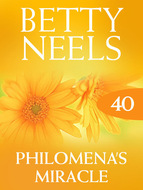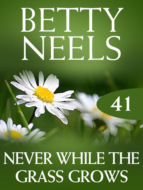Kitap dosya olarak indirilemez ancak uygulamamız üzerinden veya online olarak web sitemizden okunabilir.
Kitabı oku: «A Matter of Chance»
“You are at perfect liberty to go on disliking me if you wish, and you may disagree with me as much as you like.”
“I’ve never said…” began Cressida. “Er—no, not in so many words, but I am a lazy, thoughtless man who has to be reminded of his duty to his partners and has far too easy a life….”
“I never…” started Cressida once more, bristling with indignation even while she had to admit that was exactly what she had thought of him—but not anymore. She looked him in the eye and said soberly, “You’re quite right, I did think something like that, but I don’t now. You’ve been super, working around the clock and never complaining. I daresay you only needed someone to remind you….”
He let out a tired roar of laughter and she asked snappily, “Now what have I said?”
“Oh, my dear girl, you’re a dozen women rolled into one! Go to bed before I say something I shouldn’t.”
She had got to her feet, but now she paused. “What?”
“Never mind what—disregard anything I’ve said. I’m tired. Disregard this, too.” He had come around the table and caught her close. Even with a bristly chin his kiss was something to remember.
About the Author
Romance readers around the world were sad to note the passing of BETTY NEELS in June 2001. Her career spanned thirty years, and she continued to write into her ninetieth year. To her millions of fans, Betty epitomized the romance writer, and yet she began writing almost by accident. She had retired from nursing, but her inquiring mind still sought stimulation. Her new career was born when she heard a lady in her local library bemoaning the lack of good romance novels. Betty’s first book, Sister Peters in Amsterdam, was published in 1969, and she eventually completed 134 books. Her novels offer a reassuring warmth that was very much a part of her own personality. She was a wonderful writer, and she will be greatly missed. Her spirit and genuine talent will live on in all her stories.
A Matter of Chance
Betty Neels

MILLS & BOON
Before you start reading, why not sign up?
Thank you for downloading this Mills & Boon book. If you want to hear about exclusive discounts, special offers and competitions, sign up to our email newsletter today!
Or simply visit
Mills & Boon emails are completely free to receive and you can unsubscribe at any time via the link in any email we send you.
CONTENTS
CHAPTER ONE
CHAPTER TWO
CHAPTER THREE
CHAPTER FOUR
CHAPTER FIVE
CHAPTER SIX
CHAPTER SEVEN
CHAPTER EIGHT
CHAPTER NINE
CHAPTER ONE
CRESSIDA BINGLEY stood at the corner of narrow, dingy street in the heart of Amsterdam and knew that she was lost—temporarily at least. She peered at the map she was holding without much success; the October afternoon was darkening, so that to study it was fruitless. She tried to remember in which direction she had walked from the Dam Square, but the city was built like a spider’s web with canals for its threads, and she had wandered aimlessly, looking around her without noting her whereabouts. She bent her head and peered down once more, but the long, foreign names, only half seen in the gathering dusk, eluded her; she was frowning over them when someone spoke behind her and she almost dropped the map. Presumably she had been addressed in Dutch, for she hadn’t understood a word. She sighed, for this was the third time that afternoon that a man had stopped and spoken to her; she had been polite with the first one, a little impatient with the second, but now she was vexed. She turned sharply and said in a cold voice, ‘I can’t understand you, so do go way!’
Her voice died as she saw him; he towered over her own five feet eight inches by at least another eight inches. But it wasn’t only his height, he was large, too, blocking her way, and even in the poor light she could see that he was handsome, with a nose which dominated his face, its flared nostrils giving it an air of arrogance. She couldn’t see the colour of his eyes, but the brows above them were winged and as pale as his hair. He wasn’t quite smiling, his mouth had a mocking quirk, that was all.
‘English,’ he observed, ‘and telling me to go away when you’re lost.’ His deep voice mocked her, just as his smile did, and it annoyed her.
‘I am not lost,’ she protested untruthfully. ‘I stopped to look at the map…there is no need for you…’
A large, gloved hand took the map from her grasp and turned it right side up. ‘Try it that way,’ he suggested, ‘and unless you are quite sure where you are, even in the dark, I suggest you put your pride in your pocket and let me show you the way—it will be night in another ten minutes, and,’ he added blandly, ‘this isn’t a part of Amsterdam which tourists frequent—certainly not young women such as yourself, at any rate.’
She could hear the amusement behind the blandness and her annoyance sharpened even while she had to admit that she was lost. The street was empty too, and even if someone came along they might not understand her; she would be at a disadvantage. She said stiffly: ‘If you would direct me to the Rembrandt Plein—I can find my way from there.’
He looked down at her, smiling quite openly now. ‘Very well. Go to the end of this street on your left, turn right and take the second turning on the right—there’s a narrow lane half way down which will bring you out into a small square which has five streets leading from it—take the one with the tobacconist’s shop on the corner; you’ll find the Rembrandt Plein at the end of it.’
Cressida shot him a cold look. ‘I think I’ll do better if I find my own way, thank you, though I’m sure you mean to be kind…’
He shook his head. ‘I’m seldom that,’ he assured her placidly, ‘but I intend to take you as far as the Rembrandt Plein—it isn’t far and I know all the short cuts.’ He added silkily: ‘You can always scream.’
The thought had crossed her mind too, so that she said very emphatically: ‘I have no intention of doing any such thing; I’m very well able to look after myself.’
He smiled again and began to walk briskly down the street he had pointed out to her, and after a moment or so, made a few desultory remarks about Amsterdam and the weather, adding the kind of questions usually asked of tourists: had she seen the Dam Palace, Rembrandt’s House, the Rijksmuseum… She answered briefly, intent on keeping pace with his long stride, managing to steal a glance or two at him as they went. He was older than she had first supposed, well into his thirties, she would imagine, and dressed with a quiet elegance which, for some reason, reassured her. If they hadn’t started off on the wrong foot, she thought belatedly, she could have asked him where he lived—what he did…’ Am I taking you out of your way?’ she asked suddenly.
She got an uncompromising ‘Yes,’ and he added, ‘but it’s of no importance,’ and at that moment they turned a corner and she saw the Rembrandt Plein not many yards away. ‘I’m sorry,’ she said stiffly. ‘I must have taken up your time—I know where I am now.’ She came to a halt. ‘Good night, and thank you.’
‘Don’t be silly,’ he spoke with amused impatience. ‘Where is your hotel?’
Rather to her own surprise, she told him quite meekly, and fell into step beside him again while he crossed the square, its cafés and clubs still half empty before the evening crowds arrived, and took another narrow street on its opposite side.
‘This isn’t the way,’ said Cressida, and stopped again.
‘A short cut. My dear good girl, when will you realise that I am merely seeing you to your hotel as quickly as possible, and am not bent on getting to know you—picking you up is the expression, I believe.’
If she had known where to go, she would have left him then and there, but she didn’t. She walked beside him, too furious to speak, until the street turned at right angles and opened into the broad street running beside a canal where her hotel was. At its door she wished him a chilly good night, offered even chillier thanks, and whisked herself in through its narrow door. The chilliness was wasted on him, though, for he laughed softly and didn’t say a word. He was detestable, she told herself, as she ran up the precipitous stairs to the top floor.
The hotel was small and narrow, supported on either side by equally small and narrow houses—hotels too—a dozen of them in a neat row, with immaculate curtains at their shining windows and semi-basement dining rooms where their guests breakfasted, and where they could, if they wished, have a snack in the evening. Cressida reached the top floor and went down the passage with its rows of doors. Her room was at the end, small, spotlessly clean and pleasantly warm. It was almost six o’clock. In half an hour she would go all the way downstairs again and have coffee and a broodje and then come back and pack her bag, but now she sat on the bed, still in her coat, suddenly doubtful about everything. If someone had told her two weeks ago that she would be staying in an Amsterdam hotel, en route for a job in Friesland, she would have laughed at the very idea, yet here she was—and looking back, she wondered at the quirk of fate which had hurried her along towards it, making everything so easy and giving her no time to think until she was here…she took off her coat and started to unpin her hair and then sat brushing it, while she brooded about her future.
Her hair was fine and silky and very dark, hanging down to her waist. Her brows were dark too, thick and well shaped above large brown eyes, generously lashed. Her nose was small and straight and her mouth curved delightfully—a beautiful face, and she had a figure to match it. But although she was staring at her reflection in the small wall mirror, she didn’t really see it. ‘I must be mad,’ she said out loud, and quite forgetful of her hair, put down the brush and did nothing at all while she looked back over the last week or so. Not too far back; she still couldn’t think of her father’s death and then her mother’s so soon after without a deep grief which threatened to engulf her. Her father had been ill for only a few days; visiting a parishioner with ‘flu, he had fallen a victim to it himself, and while the parishioner recovered, her father had died, and then, within a week, her mother, leaving her alone and desolate but with little time for grief, for the rectory had to be vacated, the furniture sold and a few modest debts paid, and when that was done, there was very little money over.
It had been a wrench to leave the village in Dorset where she had spent her childhood and all her holidays since she had taken up nursing; she had gathered together a few of her parents’ most loved bits and pieces, packed her clothes, and gone to stay with her mother’s elder sister, a small, bustling woman who lived alone in a minuscule thatched cottage on the edge of a village in the same county. It was while she was there that she decided to give up her job at the big London hospital where she was Sister of a medical ward, and until she could make up her mind about her future, take private cases. And Aunt Emily had agreed; change, she had observed wisely, was absolutely essential when one had been dealt such a severe blow—and time, time to think about the future and come to terms with it. She thought privately that Cressida would certainly marry later on, once the icy grief which held her fast had thawed a little and she could laugh again and enjoy meeting people. But that was something she couldn’t tell her niece; all she could do was to tell her to regard the overcrowded little cottage as her home and know that she was welcome there.
A couple of weeks’ peace and quiet had helped Cressida a great deal. Armed with excellent references and a resolve to make a new life for herself, she went up to London and presented herself at an agency highly recommended by her hospital. The temptation to take the first job offered to her was great, but she still had a little money, enough to stay in a rather seedy hotel for a week, until a case turned up which would appeal to her, so she rejected the first few offered to her; a child film star with tonsillitis, a young drug addict, a wealthy widow who really wanted a slave, not a nurse. After the third day she wondered if she was being unduly fussy; some of the girls she met there came in, accepted a case, and were away again in five minutes. But there was another girl who was choosy too—Molly, a small, fair creature with a sweet, rather weak face, who confided to Cressida that she was waiting for a job as far away as possible because she had quarrelled with her fiancé and never wanted to see him again. It was towards the end of the week when she told Cressida that she had got a job, and not through the agency. ‘My uncle got it for me; at least, this doctor asked him to find a nurse who could type, and I can. You see, he’s writing a book and he needs an English girl—a nurse who’ll understand the medical terms—so that she can help him with the English and type it too—and he lives in Holland, so I can get away from Jim.’
She skipped away in great good spirits, leaving Cressida to make the difficult choice between a case of delirium tremens and an elderly lady who wanted someone to see her through the brief trials of having all her teeth out. Cressida decided against them both, was treated to a brief homily by the agency clerk on being too fussy, and left in her turn, to walk in St James’s Park and wish that the months could roll back and she could be on her way home for her holidays. She walked on steadily; she wasn’t going to cry, she told herself firmly, not in the middle of a public park, at any rate. She had sat down on a bench and made a great business of feeding the birds with the sandwiches she had brought with her for lunch and didn’t want.
She hadn’t seen Molly on the following morning and hadn’t expected to; probably she was on her way to Holland already. Waiting her turn, she promised herself that she would take the first case she was offered, but when she got into the office the clerk said briskly: ‘Sorry, there’s nothing today—if you’d been here half an hour earlier I could have fixed you up… Better luck tomorrow.’
She smiled her bright, meaningless smile and Cressida smiled back, not sure if she was relieved or not. She was standing in the agency entrance, trying to make up her mind what to do with her empty day, when Molly came dashing towards her.
‘I hoped I’d find you,’ she cried breathlessly. ‘I’ve a whole lot to tell you and it’ll take a minute or two. There’s a café down the street, come and have some coffee.’
‘You’ve made it up with your Jim,’ declared Cressida.
Molly caught her by the arm. ‘Yes, I have, isn’t it super? But that isn’t all.’
She had dragged Cressida down the street towards the café. ‘That job—the one I said I’d take in Holland—well, I can’t go now, can I? I mean, Jim wants us to get married straight away—so I thought of you…’ She had paused maddeningly as they entered the café, found a table and ordered coffee. ‘You can type, you told me so—and the job is about the alimentary system and its disorders, and you’ve had a medical ward…don’t you see? It’s just made for you.’
‘But I can’t,’ said Cressida. ‘I don’t know this doctor and he doesn’t know me.’
Molly opened her handbag and dragged out a small pile of letters. ‘Here are all the letters so’s you can see that it really is a job—and my uncle says if you could go and see him—he lives in Hampstead, he’s got a practice there—this afternoon after surgery…’ She had sugared her coffee and continued: ‘Oh, you must! You wanted something interesting and different, didn’t you? Uncle says it would take about six or seven weeks, and the pay’s good. At least go and see my uncle.’
And Cressida had said yes quickly before she could change her mind.
Molly’s uncle had been nice; elderly and a little slow, and although he had asked her a great many questions, he had been so nice about it that she hadn’t minded answering them. ‘It seems to me,’ he told her finally, ‘that this job is just what you need. I appreciate your need to get away, Miss Bingley, and Doctor van Blom is most anxious to find someone who can type adequately as well as give him occasional help with the turn of a phrase and so on.’ He smiled kindly. ‘May I take it that you will help him out?’
Cressida had said that yes, she would like to very much, but she would have to get her passport renewed and pack a few things. He had nodded and said, ‘Quite—could you be ready in four or five days’ time?’
They had made their arrangements there and then, but it was Cressida who had decided to leave two days earlier and spend them in Amsterdam. One of her friends at the hospital gave her the name of the hotel and she had had no difficulty in getting a room.
She had spent her two days exploring the city, spending hours in the museums, walking endlessly beside the canals, looking at the old houses which lined their banks, eating frugally at lunch bars, and window-shopping. And now, in the morning, she would catch a train to Leeuwarden where she would be met.
She glanced at the clock and began to coil her hair rapidly; the dining room was only open for a short time each evening; the hotel guests were expected to dine out, the snacks were for those who had just arrived, or who, for some reason or other, were going to spend their evening in their rooms.
There was a very small room by the entrance where one could get a drink or coffee, but Cressida had never seen anyone in it. She did her face and washed her hands and went down the staircase once more, to the basement, where she sat down at a table for one, drank the coffee she ordered and ate two ham rolls. They were excellent, but she had very little appetite. Indeed, she had grown thin during the last few weeks; meals, like so many other things, had become just something to get through as best she might. She supposed that in time everything would be normal again, as the incoming rector had assured her when he had called to make himself known to her and arrange to move into the rectory. Time he had said, healed everything, and she hadn’t disputed that fact; only time, when it lay heavy, took a long time to pass.
She went back to her room presently and packed her case, had a shower in the cramped cabinet down the passage, and got into bed. She wasn’t sleepy, but bed gave an illusion of cosiness. She had a sudden, vivid memory of the sitting room in her old home, with a log fire blazing in the hearth and the shabby armchairs pulled close to it, and for a moment she couldn’t see the map she was studying for the tears in her eyes, but she brushed them away resolutely and applied herself once more to its perusal. Molly’s uncle had told her that Doctor van Blom lived in a village between Groningen and Leeuwarden, he had told her the name too, but the two cities were thirty miles apart and from the numerous villages between, not one of their peculiar-looking names rang a bell of recognition. She would have to wait and see.
The tram Cressida took to the station in the morning was packed with early morning workers, but the train, when she eventually found the right platform and caught it by the skin of her teeth, was almost empty. She sat in her corner seat, watching the small flat fields give way to the woods and heaths of the Veluwe and then fields again, but now they had become wide and rolling and the towns less frequent. She had chosen to go via Groningen, and that city, when the train reached it, looked invitingly picturesque as well as large and bustling. As the train pulled away from the station she craned her neck to see the last of its spires and towers and then turned to look at the countryside with some eagerness. Somewhere close by was the village where she was to spend the next few weeks. She stared at the strange names on the station boards as they passed, but both Dutch and Friesian names were quite incomprehensible to her. However, she had been told not to worry about the language; Doctor van Blom spoke excellent English and the people she would meet would have a sufficient knowledge of it to make her lack of Dutch no problem at all.
She got out at Leeuwarden station with much the same feeling as she experienced when she entered a dentist’s surgery; her future employer might be bad-tempered, impatient, a slave-driver… She stood under the clock on the platform as she had been told to do, and looked around her, and a great many people looked back at her, for she was quite eye-catching, her beautiful face pale with excitement and apprehension, her nicely cut tweed coat showing off her slenderness to perfection, the brown fur hat perched on top of her shining bun of hair highlighting its vivid darkness.
She didn’t have to wait long; from the people around her there emerged a short, stout man in his late middle years. He came straight at her, beaming all over his nice round face, beginning to talk to her long before he reached her. ‘Miss Bingley—Miss Cressida Bingley—what a charming name! I am delighted to welcome you; you see that I knew you at once.’ He was pumping her arm up and down as he spoke. ‘My old friend Doctor Mills described you so well…you have luggage with you? This case only? Then we will go to the car at once and return to my home as quickly as possible. We will drink coffee together and talk of my book which I am so anxious to complete.’
He walked as he talked, his hand on her arm, edging her towards the station entrance where a splendidly kept dark blue Chevrolet stood. He ushered her into the front seat, put her luggage in the boot and got into the driving seat. ‘Fifteen of your English miles,’ he observed, ‘we shall be there very shortly.’
But not as shortly as all that, Cressida discovered. They drove very slowly through the city, a busy, bustling place she wanted to explore, and she wondered if there was something about Dutch motoring laws she didn’t know—a twenty-mile speed limit in towns, for instance, and yet everyone else was travelling twice as fast. Perhaps her new employer was just a very cautious driver. On the outskirts of Leeuwarden he achieved a steady thirty, while cars flashed past at thrice that speed and Cressida, who in happier times had driven her father’s car rather well, longed to stretch out a neatly booted foot and slam it down on the accelerator, for it seemed to her a crying shame to own such a powerful car and not make use of it. She kept her itching foot still and watched the slowly passing scenery while she answered her companion’s stream of questions. Even if he was a shocking driver, he was rather an old dear.
They turned off the main road presently and trickled cautiously down a narrow lane. ‘Eestrum,’ the doctor informed her as they approached and passed through a smallish village. ‘We go to Augustinusga, that is where I live, so well placed between Leeuwarden and Groningen. It is convenient for me—and my partners—to travel to either place.’
‘Partners?’ asked Cressida. No one had mentioned them.
‘Doctor Herrima—we share a house and a housekeeper—and Doctor van der Teile, who is the senior partner and does not live in the village. We consult him, you understand; all the more difficult cases, but for the most of the time he is either at Leeuwarden or Groningen, for he has beds in both hospitals as well as consulting rooms. He is a distinguished physician and travels a good deal.’
Cressida murmured politely; he would be a very elderly man, she imagined, for Doctor van Blom was certainly in his sixties and this other partner was the senior…the third partner would be the youngest and the junior. The three bears; she suppressed a giggle.
Her companion had dropped the car’s speed to a smart walking pace and began pointing out local landmarks. A windmill, standing lonely in the wintry fields by a canal, a little wood on the other side of the water, bare and dull in the morning’s grey bleakness, but, she was assured, a charming place in the spring. An austere red brick church with plain glass windows came into view and a cosy little house beside it. ‘The dominee and his wife live there,’ explained Doctor van Blom. ‘A good friend of ours, and here, at the beginning of the village, is an excellent example of our Friesian farms.’
Cressida was still craning her neck to see the last of it as they entered the village itself, circled the square lined with houses and stopped cautiously outside one of them, a red brick house with its door exactly in the centre and its windows arranged across its face in mathematical rows. She hoped it wasn’t as plain inside as it was out, and had her hope realised; the front door opened on to a long, narrow hall, lofty-ceilinged and a little dark and from which numerous doors opened. Doctor van Blom threw open the first of these and ushered her in, at the same time raising his voice in a mild bellow. This was instantly answered in person by his housekeeper, a tall, thin woman, no longer young but with such a forceful air about her that one could have imagined her barely in her prime. She smiled at the doctor, smiled at Cressida, shook her hand and followed them into what was obviously the sitting-room, comfortably furnished, the leather chairs a little shabby perhaps, but there was some beautiful china and silver lying around on shelves and tables, rather as though someone had just been admiring the objects and set them down haphazardly. There were shelves of books, too, and an old-fashioned stove giving off a most welcome heat.
Cressida took the chair she was offered and surrendered her coat to the housekeeper, her unhappy heart much cheered by her kindly reception, and when Juffrouw Naald went away and came back a moment later with a tray laden with coffee-cups and biscuits, she partook of these refreshments with more pleasure than she had felt for some time.
They had been sitting for perhaps ten minutes when the door opened and a tall, thin man, about the same age as Doctor van Blom, came in. ‘My partner, Doctor Herrima,’ her employer told her, and after introductions had been made, Cressida found herself sitting between the two of them, filling their coffee-cups and answering their gentle questions.
‘A pretty girl,’ observed Doctor Herrima to no one in particular, ‘a very pretty girl.’ He looked keenly at her. ‘And you can type, I understand?’
She assured him that she could.
‘You are also a nurse?’
‘Oh, yes,’ she told him, ‘I’ve been trained for more than four years.’
He looked across at his partner. ‘A splendid choice.’ And when his partner nodded happily, ‘What do you think of our country, Miss Bingley?’
Cressida put down her cup. ‘Well, I haven’t seen a great deal of it. Two days in Amsterdam and then coming here by train…’
‘You must see Leeuwarden and Groningen—now there are two magnificent centuries-old cities. Do you drive?’ It was Doctor van Blom who spoke.
‘Yes—we had a rather elderly Morris.’
‘Ah.’ He pondered this for a minute. ‘My car is a powerful one, as you may have noticed, and Doctor Herrima runs a BMW. I do not know if you feel competent to drive either of them?’ He sounded doubtful.
Cressida thought of the snail-like pace at which they had driven from Leeuwarden and replied soberly that she thought she would be capable of driving either of the cars. Indeed, the idea of driving the Chev on one of the excellent motorways appealed to her very much: to drive and drive and drive, away from her grief and loneliness.
She shut her mind to the idea and made a suitably admiring remark about the car, to which Doctor van Blom responded with instant eagerness. They were two dears, she decided; unworldly and content in their rather cluttered, pleasant sitting-room.
She asked diffidently about their practice and was told at some length and sometimes twice over that it was a large one, covering a great number of outlying villages and farms; that they had a baby clinic once a week, a small surgery for emergencies, and dealt with a wide variety of patients.
‘There are quite a number of accidents,’ explained Doctor van Blom, ‘farms, you know—they have these modern machines, some of them are complicated and if a farm worker doesn’t understand what he is doing…’ He gave a little shrug. ‘And then of course there are those who live some way away, and they tend to delay sending for us or coming to the surgery, and sometimes the injury or illness is made much worse in consequence. We have splendid hospitals, of course, and our senior partner is always available for consultation.’ He wagged his balding head. ‘A very clever man,’ he stated, ‘as well as our great friend. He had an English godfather, and you will find his English excellent.’
Cressida dismissed this paragon with a nice smile and asked about the book. ‘When would you like me to start?’ she wanted to know.
‘You feel that you could start today? Splendid, Miss Bingley—perhaps after lunch?’
‘That would be fine, and please will you call me Cressida?’
They both beamed at her. ‘With pleasure. And now you would like to go to your room and unpack. We have lunch at noon—is that time enough for you to settle in?’
They escorted her to the door, cried in unison for Juffrouw Naald, and stood watching her as she trod up the steep, uncarpeted stairs to the floor above, with the housekeeper leading the way.
Her room was in the front of the house, a corner room with big windows so that she had a wide view of the square below and the houses around it. It was nicely furnished if a trifle heavily, with Second Empire mahogany bed, matching chest of drawers, a ponderous dressing table and an enormous clothes closet. There was a small easy chair by the window and a writing table and a little shelf of books. Leading from it was a well-appointed bathroom; after the tiny room in Aunt Emily’s cottage, it seemed like luxury to Cressida. Someone had put chrysanthemums in a vase by the bed too; she smiled and touched them and looked at Juffrouw Naald who smiled and nodded and said something Cressida couldn’t understand, but it sounded friendly.
Ücretsiz ön izlemeyi tamamladınız.








